Incentive Project Planning
As part of CALeVIP, California Energy Commission staff works with transportation experts at the Center for Sustainable Energy to design, promote and implement targeted incentive projects to support statewide electric vehicle (EV) charging infrastructure. Each proposed incentive project is vetted through a public workshop process to seek input from stakeholders to inform project development and implementation.
Incentive project design is driven by the Electric Vehicle Infrastructure Projection (EVI-Pro) modeling tool developed by Energy Commission staff and the National Renewable Energy Laboratory. EVI-Pro estimates the number of charge points that will be needed at the county level while accounting for differing charger power levels, location types and plug-in electric vehicle (PEV) adoption rates to ensure that PEV drivers can meet their transportation needs. The model is updated quarterly.
The specific CALeVIP questions EVI-Pro can answer include estimating where local and regional gaps exist in charging station deployment, how many EV chargers will be needed to meet the goals of the ZEV Action Plan, the approximate costs of infrastructure and how differences in travel behavior and housing types will impact PEV charging demand.
In developing incentive projects, Energy Commission staff also reaches out to regional public agencies, utilities and businesses as partners to leverage available funding to expand EV charging infrastructure to assure the needs of current and future EV drivers are accommodated.
